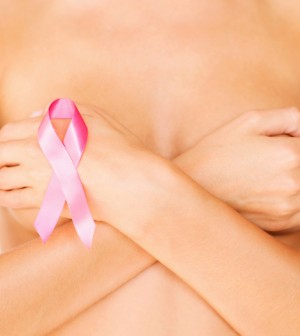- Finding Unshakable Power in a World That Wants to Pull Us ApartPosted 5 months ago
- What could a Donald Trump presidency mean for abortion rights?Posted 5 months ago
- Financial Empowerment: The Game-Changer for Women in Relationships and BeyondPosted 7 months ago
- Mental Health and Wellbeing Tips During and After PregnancyPosted 7 months ago
- Fall Renewal: Step outside your Comfort Zone & Experience Vibrant ChangePosted 7 months ago
- Women Entrepreneurs Need Support SystemsPosted 7 months ago
Stop Pinkwashing and Start Encouraging Breast Health - SW

By Dr. Christiane Northrup, M.D.
Our culture is obsessed with breasts. Let’s face it—breasts are pretty wonderful. Yes, I said wonderful! They nurture you when you are a child and provide you (and your partner) with sensual pleasure when you are older. Your breasts are a vital part of your woman’s wisdom, letting you know when you’ve created a healthy balance between nurturing yourself and others. But this important message is lost amid the pinkwashing hoopla that is Breast Cancer Awareness month.
 What is pinkwashing? It’s the now ubiquitous marketing of Breast Cancer Awareness Month that incorporates the pink ribbon and the color pink in products and promotions in October. While I certainly hope we find a cure for breast cancer—and every other kind of cancer—I don’t think that buying pink candy, using makeup that includes a pink ribbon in its packaging, or watching an NFL game with players wearing pink gloves, wrist bands, or socks is the way to promote breast health.
What is pinkwashing? It’s the now ubiquitous marketing of Breast Cancer Awareness Month that incorporates the pink ribbon and the color pink in products and promotions in October. While I certainly hope we find a cure for breast cancer—and every other kind of cancer—I don’t think that buying pink candy, using makeup that includes a pink ribbon in its packaging, or watching an NFL game with players wearing pink gloves, wrist bands, or socks is the way to promote breast health.
Think about it: The candy still contains sugar, an ingredient known to feed cancer cells, and the makeup may contain parabens, a preservative and known estrogen disruptor. And while a man playing in pink or sporting an outrageous pink hairstyle may help raise money for the American Cancer Society, it also promotes corporate profits and the company image of the NFL or its players.
I know women agree because their thoughts and feelings were heard in the documentary Pink Ribbons, Inc., which explains how “Supporting the Cure” has become more about boosting corporate sales and company identity, and less about the real women who are tackling the very unglamorous and treacherous slope of breast cancer recovery.
I’ve long advised that instead of fighting or having wars on something, it is much better to lovingly encourage our desired outcome. So this month, I want to encourage breast health—and make you AWARE of what you can do to protect your precious breasts. This shifts the focus from curing to preventing.
- Choose thermography not mammography. Thermography is a technology that picks up thermal changes in breast tissue. These thermal changes are the precursors for breast tissue anomalies that can become cancerous. Unlike a mammogram, a thermogram—a breast exam using thermography—isn’t invasive. No one touches or flattens your breasts, and there is absolutely no radiation exposure.
One of the reasons I like thermography is it often gives you time to change your habits and improve the health of your breast tissue. That’s because thermography can find potential problems years before a mammogram can detect cancerous cells.
- Iodine is a powerful antioxidant, and studies show it plays a role in preventing and treating breast cancer.1 It does this by decreasing the ability of estrogen to adhere to estrogen receptors in the breast.
2 This ties into the compelling evidence that iodine deficiency is a cause of breast cancer. Iodine taken in doses of 100–150 mcg per day is considered a therapeutic dose.
As I wrote in Women’s Bodies, Women’s Wisdom, and in the article “Relief for Common Breast Symptoms,” sore, tender, or lumpy breasts are very common and fibrocystic changes are often benign. About 45 percent of women who visit breast care clinics have breast pain, and could benefit from 6 mg to 90 mg of iodine daily. 3 Taking iodine at these levels eliminates breast pain from fibrocystic changes about 70 percent of the time.4
- Take a comprehensive multivitamin/mineral supplement that is rich in antioxidants, including vitamin C, E, B-complex, D, and beta-carotene. Antioxidants help the cells in your breasts fight cellular inflammation, which can be a precursor to breast cancer.
Get plenty of vitamin D, too. Studies show that women with optimal levels of vitamin D have a lower risk of breast cancer. Your vitamin D level should be at least 40 ng/ml; 60-80 ng/ml is optimal. Ask for your actual vitamin D level. Don’t settle for “It’s normal” as an answer. If it’s in the suboptimal range, talk with your doctor and come up with the best strategy for raising your levels of this important nutrient. Be prepared to take up to 50,000 IUs per week until your levels are high enough and then 1,000–5,000 IUs per day after that.
If you like pink wear it! But know that breast health begins with this: enjoying your life and welcoming pleasurable experiences into it on a daily basis.
You have the ability to create and enjoy vibrant health every day and until you take your last breath, regardless of your genetic makeup or family history.
- B. A. Eskin et al., “Mammary Gland Dysplasia in Iodine Deficiency,” Journal of the American Medical Association, vol. 200 (1967), pp. 115–19.
- IBID.
- Kessler, “The Effect of Supraphysiologic Levels of Iodine on Patients with Cyclic Mastalgia.”
- 2. J. H. Kessler, “The Effect of Supraphysiologic Levels of Iodine on Patients with Cyclic Mastalgia,” The Breast Journal, vol. 10, no. 4 (2004), pp. 328–36; W. R. Ghent et al., “Iodine Replacement in Fibrocystic Disease of the Breast,” Canadian Journal of Surgery, vol. 35, no. 5 (Oct. 1993), pp. 453–60.
 Christiane Northrup, M.D., a board-certified ob/gyn, is a visionary pioneer, beloved authority in women’s health and wellness, and the author of the ground breaking New York Times bestsellers Women’s Bodies, Women’s Wisdom and The Wisdom of Menopause. Her third book, Mother-Daughter Wisdom, was voted Amazon’s #1 book of 2005 (in two categories). In, The Secret Pleasures of Menopause and The Secret Pleasures of Menopause Playbook, Dr. Northrup teaches how to experience joy, pleasure, prosperity, fulfillment, and vibrant health. Her children’s book, Beautiful Girl, brings her positive message to the youngest of girls. Her books have been translated into 24 languages. Following a 25-year career in both academic medicine and private practice, Dr. Northrup devotes her time to helping women truly flourish. Follow Dr. Christiane Northrup on Facebook, Twitter, at www.drnorthrup.com, and by listening to her weekly Hay House Internet radio show Flourish!
Christiane Northrup, M.D., a board-certified ob/gyn, is a visionary pioneer, beloved authority in women’s health and wellness, and the author of the ground breaking New York Times bestsellers Women’s Bodies, Women’s Wisdom and The Wisdom of Menopause. Her third book, Mother-Daughter Wisdom, was voted Amazon’s #1 book of 2005 (in two categories). In, The Secret Pleasures of Menopause and The Secret Pleasures of Menopause Playbook, Dr. Northrup teaches how to experience joy, pleasure, prosperity, fulfillment, and vibrant health. Her children’s book, Beautiful Girl, brings her positive message to the youngest of girls. Her books have been translated into 24 languages. Following a 25-year career in both academic medicine and private practice, Dr. Northrup devotes her time to helping women truly flourish. Follow Dr. Christiane Northrup on Facebook, Twitter, at www.drnorthrup.com, and by listening to her weekly Hay House Internet radio show Flourish!


